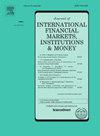贸易开放能否促进发展中国家的经济增长?
IF 5.4
2区 经济学
Q1 BUSINESS, FINANCE
Journal of International Financial Markets Institutions & Money
Pub Date : 2024-04-12
DOI:10.1016/j.intfin.2024.101985
引用次数: 0
摘要
本研究探讨了贸易开放对东南亚国家联盟经济增长的影响。贸易开放与贸易壁垒水平低和贸易量大有关。较低的贸易壁垒可能会对发展中经济体的国内生产总值产生负面影响,这意味着过度的贸易开放可能会阻碍经济增长。相反,贸易量的增加会对国内生产总值产生积极影响,从而凸显贸易开放对经济增长的潜在优势。我们确定了贸易壁垒的调节作用,指出在贸易壁垒较高的国家,贸易量的增加与更强劲的经济增长相关联。本文章由计算机程序翻译,如有差异,请以英文原文为准。
Does trade openness promote economic growth in developing countries?
This study examines the influence of trade openness on economic growth in the Association of Southeast Asian Nations. Trade openness is associated with low levels of trade barriers and high levels of trade volumes. Lower trade barriers may negatively affect GDP in developing economies, implying that excessive trade openness could impede economic growth. Conversely, increased trade volumes positively affect GDP, highlighting the potential advantages of trade openness for economic growth. We identify the moderating role of trade barriers, noting that in countries with high trade barriers, increased trade volumes are associated with stronger economic growth.
求助全文
通过发布文献求助,成功后即可免费获取论文全文。
去求助
来源期刊
CiteScore
6.60
自引率
10.00%
发文量
142
期刊介绍:
International trade, financing and investments, and the related cash and credit transactions, have grown at an extremely rapid pace in recent years. The international monetary system has continued to evolve to accommodate the need for foreign-currency denominated transactions and in the process has provided opportunities for its ongoing observation and study. The purpose of the Journal of International Financial Markets, Institutions & Money is to publish rigorous, original articles dealing with the international aspects of financial markets, institutions and money. Theoretical/conceptual and empirical papers providing meaningful insights into the subject areas will be considered. The following topic areas, although not exhaustive, are representative of the coverage in this Journal. • International financial markets • International securities markets • Foreign exchange markets • Eurocurrency markets • International syndications • Term structures of Eurocurrency rates • Determination of exchange rates • Information, speculation and parity • Forward rates and swaps • International payment mechanisms • International commercial banking; • International investment banking • Central bank intervention • International monetary systems • Balance of payments.

 求助内容:
求助内容: 应助结果提醒方式:
应助结果提醒方式:


